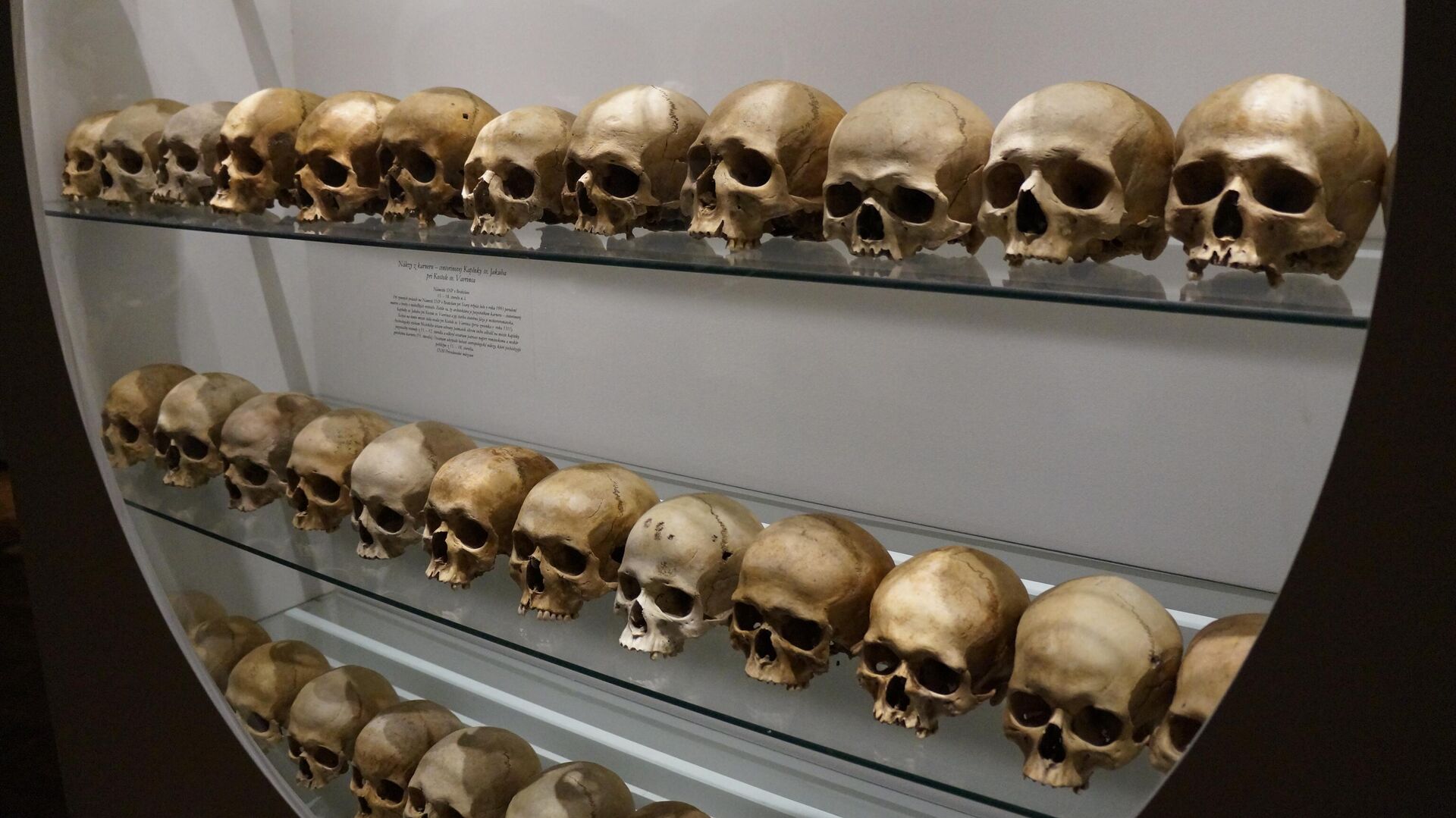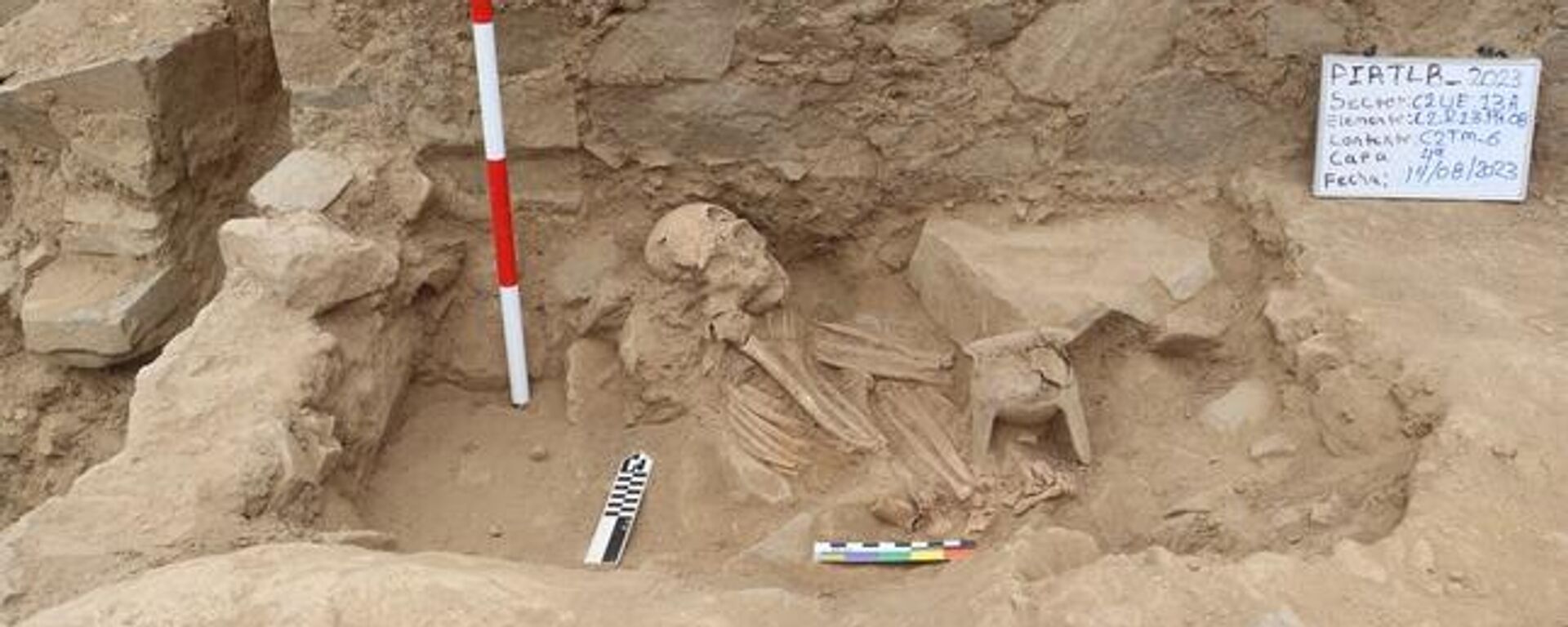https://en.sputniknews.africa/20230906/dna-tests-of-skulls-taken-from-german-east-africa-provides-link-to-living-relatives-1061924111.html
DNA Tests of Skulls Taken From German East Africa Provides Link to Living Relatives
DNA Tests of Skulls Taken From German East Africa Provides Link to Living Relatives
Sputnik Africa
The German colonial lands comprised of parts of several African countries, including parts of present-day Burundi, Rwanda, Tanzania, Namibia and Cameroon among... 06.09.2023, Sputnik Africa
2023-09-06T18:45+0200
2023-09-06T18:45+0200
2023-09-06T18:45+0200
germany
tanzania
namibia
colonialism
research
science
dna
sub-saharan africa
archeology
east africa
https://cdn1.img.sputniknews.africa/img/07e7/09/06/1061925485_0:160:3076:1890_1920x0_80_0_0_dce6a17680ac6063dde35ee45e379e59.jpg
Descendants of those whose relics during the colonial period were stolen from Tanzania and taken to Germany for "scientific" tests, have been found by the German researchers, the country's Museum of Prehistory and Early History reported.Since 2017, scholars of the museum reportedly studied the DNA of around 1,100 skulls of people from colonial German East Africa, which includes Rwanda, Tanzania and Kenya. The results allowed to identify their living relatives in Tanzania.The president of the museum Hermann Parzinger called the discovery "a small miracle."The museum promised to notify the Tanzanian authorities about the outcomes of the investigation.Moreover, the scientists established for one skull a complete genetic correspondence with a male person still alive today. In two more of the eight skulls examined, a direct biological relationship in an uninterrupted paternal line to other persons is at least probable, according to the museum.The discovery of the genetic match was possible due to the title "Akida", which has been preserved on the skull. It implied that the deceased individual could have been a high-ranking adviser to Mangi Meli, a powerful leader of the Chagga ethnic group in the late 1800s, the museum said.The DNA tests reportedly enabled the researchers to find the connection of the skull with descendant of Akida and, for two other skulls, almost a total correspondence with Chagga people was confirmed.The museum also highlighted that out of the examined remains, over 900 skulls "could be assigned to areas in present-day Rwanda", around 200 to Tanzania and more than 25 to Kenya.In 2011, local Charite hospital provided the museum with a collection of about 7,700 skulls, most of which were assembled by the doctor and anthropologist Felix von Luschan during German colonial rule, the museum revealed.Furthermore, he emphasized that the goal of the study is to "return the remains to the countries of origin."Namibia has already received back the skulls and other human relics, taken to Germany in the colonial period, according to the museum.In 2021, Germany officially recognized the genocide of indigenous Herero and Nama people in South West Africa, which is considered by historians as the first mass killing of the previous century. What's more, in order to support the descendants of the victims, the state promised Namibia more than $1 billion.
https://en.sputniknews.africa/20230903/ten-century-old-ancestor-worship-site-discovered-in-peru-1061836343.html
germany
tanzania
namibia
east africa
kenya
rwanda
Sputnik Africa
feedback@sputniknews.com
+74956456601
MIA „Rossiya Segodnya“
2023
Rasina Musallimova
https://cdn1.img.sputniknews.africa/img/07e7/0a/17/1063019139_0:0:646:646_100x100_80_0_0_348c74b69cf86748a53875f8148a2f85.jpg
Rasina Musallimova
https://cdn1.img.sputniknews.africa/img/07e7/0a/17/1063019139_0:0:646:646_100x100_80_0_0_348c74b69cf86748a53875f8148a2f85.jpg
News
en_EN
Sputnik Africa
feedback@sputniknews.com
+74956456601
MIA „Rossiya Segodnya“
Sputnik Africa
feedback@sputniknews.com
+74956456601
MIA „Rossiya Segodnya“
Rasina Musallimova
https://cdn1.img.sputniknews.africa/img/07e7/0a/17/1063019139_0:0:646:646_100x100_80_0_0_348c74b69cf86748a53875f8148a2f85.jpg
germany, tanzania, namibia, colonialism, research, science, dna, archeology, east africa, kenya, rwanda, international
germany, tanzania, namibia, colonialism, research, science, dna, archeology, east africa, kenya, rwanda, international
DNA Tests of Skulls Taken From German East Africa Provides Link to Living Relatives
The German colonial lands comprised of parts of several African countries, including parts of present-day Burundi, Rwanda, Tanzania, Namibia and Cameroon among others. Over the past 20 years, the country has gradually begun to talk more about its colonial crimes, including genocide of the local people and conducting experiments on human remains.
Descendants of those whose relics during the colonial period were stolen from Tanzania and taken to Germany for "scientific" tests,
have been found by the German researchers, the country's Museum of Prehistory and Early History
reported.Since 2017, scholars of the museum reportedly studied the DNA of around 1,100 skulls of people from colonial German East Africa, which includes Rwanda, Tanzania and Kenya. The results allowed to identify their living relatives in Tanzania.
The president of the museum Hermann Parzinger called the discovery "a small miracle."
"Finding a match like this is a small miracle and will probably remain a rare case even despite the most meticulous provenance research," he stressed.
The museum promised to notify the Tanzanian authorities about the outcomes of the investigation.
"The relatives and the government of Tanzania will now be informed as soon as possible," the museum's statement read.
Moreover, the scientists established for one skull a complete genetic correspondence with a male person still alive today. In two more of the eight skulls examined, a direct biological relationship in an uninterrupted paternal line to other persons is at least probable, according to the museum.
The discovery of the genetic match was possible due to the title "Akida", which has been preserved on the skull. It implied that the deceased individual could have been a high-ranking adviser to Mangi Meli, a powerful leader of the Chagga ethnic group in the late 1800s, the museum said.
The DNA tests reportedly enabled the researchers to find the connection of the skull with descendant of Akida and, for two other skulls, almost a total correspondence with Chagga people was confirmed.
The museum also highlighted that out of the
examined remains, over 900 skulls "could be assigned to areas in present-day Rwanda", around 200 to Tanzania and more than 25 to Kenya.
In 2011, local Charite hospital provided the museum with a collection of about 7,700 skulls, most of which were assembled by the doctor and anthropologist Felix von Luschan during German colonial rule, the museum revealed.
Earlier, in January, the head of the museum noted that the project allowed Germany "to make amends for a past injustice."
Furthermore, he emphasized that the goal of the study is to "return the remains to the countries of origin."
“For the [museum], the clear objective of provenance research on these human remains is to return them to the countries of origin. We shared with them the results of the research over two years ago and, with the approval of the Foundation Board, we offered restitution. We are prepared to return these remains immediately, and we are now waiting for signals from the countries of origin," Parzinger underlined.
Namibia has already received back the skulls and other human relics, taken to Germany in the colonial period, according to the museum.
In 2021, Germany officially recognized the genocide of indigenous Herero and Nama people in South West Africa, which is considered by historians as the first mass killing of the previous century. What's more, in order to support the descendants of the victims, the state promised Namibia more than $1 billion.



